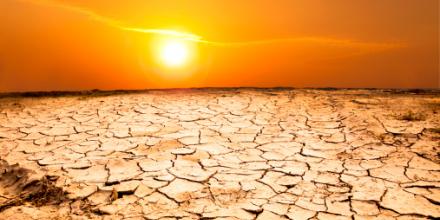
The numbers are in, and 2014 officially ranks as the hottest year since temperature record-keeping began in 1880, federal scientists announced on Friday. The average global surface temperature hit 58.24 F (14.58 C), easily surpassing the previous records, set in 2005 and 2010, by 0.07 degrees.
Two separate data sets of global temperature — from NASA and the National Oceanic and Atmospheric Administration — confirmed the record. Another data set released last week by the Japan Meteorological Agency also found 2014 was the planet’s warmest.
“The global warmth of 2014 is just another reminder that the planet is warming and warming fast,” Jonathan Overpeck, the co-director of the Institute of the Environment at Arizona State University, told the Washington Post. “Humans, and their burning of fossil fuels, are dominating the Earth’s climate system like never before.”
Global average land temperatures in 2014 were 1.80 F above the 20th century average, while ocean surface temperatures were 1.03 F above average, NOAA said. Land temperatures alone were only the fourth-warmest on record, but ocean temperatures were the warmest, which helped to make 2014 the warmest year overall.
The data also revealed that 2014 was the 38th consecutive year of above-average temperatures. That means nobody born since 1976 has experienced a colder-than-average year in their lifetime.

- Every continent experienced record high temperatures in some area. Alaska, the west coast of the United States, Europe, Australia and Siberia were among the areas that saw particularly intense temperature rises. Other regions, like the U.S. Northeast, saw relatively low temperatures.
Overall, the average global land temperature was nearly 2 degrees Fahrenheit higher in 2014 than the average temperature in the 20th century. Though a temperature rise of a few degrees may seem insignificant, University of Georgia meteorologist Marshall Shepherd likens the disparity to “the difference between a low-grade fever and one just a few degrees higher that can have an impact on the body.”
Scientists said that it’s clear that greenhouse gases added to the climate by humans are a major contributor to the warming trends. “Viewed in context, the record 2014 temperatures underscore the undeniable fact that we are witnessing, before our eyes, the effects of human-caused climate change,” climate scientist Michael Mann told The Huffington Post.
“It is exceptionally unlikely that we would be seeing a record year, during a record-warm decade, during a multidecadal period of warmth that appears to be unrivaled over at least the past millennium, if it were not for the rising levels of planet-warming gases produced by fossil fuel burning,” he added.
The new findings also counter claims that climate change has slowed or stopped in recent years. These claims cite questionable data showing that temperatures have risen at a slower rate since the turn of the century than in past decades.
“The fact that NOAA rated 2014 as the warmest year on record should put to rest the bogus idea often espoused by climate change deniers that ‘global warming stopped in 1998,’” Dr. Jeff Masters, director of meteorology at Weather Underground, told the Washington Post. “Based on the evidence, more than 97 percent of climate scientists have concluded that humans are primarily responsible for the warming of the planet to the record levels observed in 2014.”

Despite claims from climate change deniers, the evidence clearly demonstrates temporal warming trends across the globe.
While last year’s record is startling in itself, scientists pointed out that long-term trends are even more alarming. Nine out of the ten warmest years on record occurred in the 21st century, the report shows. “The key thing we’re talking about here is not just 2014, but the long-term trends,” NASA scientist Dr. Gavin Schmidt told the New York Times. “We may anticipate further record highs into the years to come.”
“Climate change is already causing significant impacts to people and ecosystems, and these impacts will grow much more severe in the coming years,” added Dr. Masters. “As we approach the critical negotiations in Paris in December [2015] to hammer out a new binding climate change treaty, we should keep in mind that we can choose to take economically sensible steps to lessen the damage of climate change, and the cost of inaction is much higher than the cost of action.”
